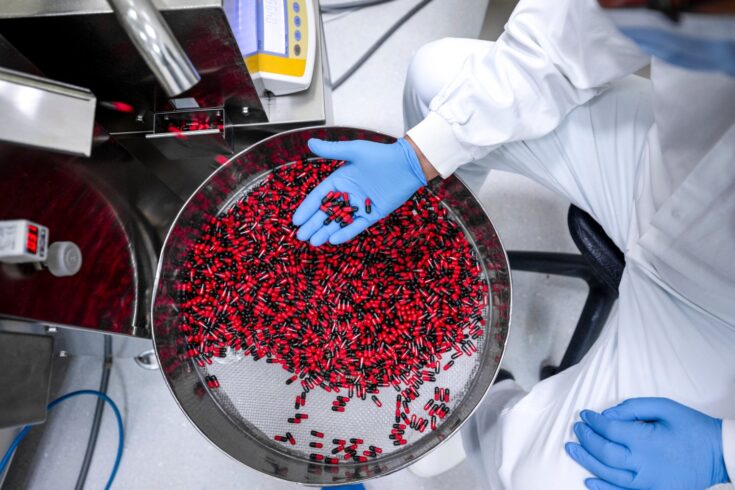Through Innovate UK’s Sustainable Medicines Manufacturing Innovation Programme (SMMIP), eight Grand Challenge projects will develop and demonstrate novel technologies for greener, more efficient medicines manufacturing.
They will scale innovations to strengthen the UK’s medicines manufacturing sector and attract investment, supporting national goals to lead in life sciences and advanced manufacturing, outlined in the UK’s Modern Industrial Strategy.
Sustainable Medicines Manufacturing Innovation Programme
SMMIP supports innovation in medicines manufacturing to:
- reduce environmental impact
- improve efficiency
- promote sustainable practices across the sector
By bringing together industry, academia and government to transform medicines manufacturing, SMMIP will strengthen the UK’s innovation ecosystem and accelerate the adoption of sustainable practices.
SMMIP is a strategic programme delivered in partnership with the Department for Health and Social Care.
It is funded as part of the wider VPAG Investment Programme agreed as part of the 2024 Voluntary Scheme for Branded Medicines Pricing, Access and Growth (VPAG).
Grand Challenges
The Grand Challenges phase of SMMIP supports large-scale collaborative, cross-sector projects.
The eight Grand Challenge projects have been awarded to drive business-led innovation, with each consortium receiving up to £10 million to deliver measurable improvements in:
- circularity
- green chemistry
- productivity and resource efficiency
The projects span:
- smart pharmaceutical packaging
- anaesthetic recycling
- artificial intelligence-powered biocatalysis
- photonic sensing
- sustainable cancer therapies
- robotics-driven manufacturing
Long term impact
Dr Stella Peace, Managing Director and Executive Director for Healthy Living and Agriculture Domain at Innovate UK, said:
These projects have the potential to drive a pivotal shift in how medicines are made in the UK, aligning with the government’s Modern Industrial Strategy.
By investing in sustainable innovation, we’re accelerating progress towards net zero, boosting sector resilience, and driving long-term economic growth.
Industry backs sustainable manufacturing
Joe Edwards, ABPI Director, UK Competitiveness and Devolved Nations said:
The pharmaceutical industry’s investment into this programme shows our commitment to modern and sustainable manufacturing practices.
We are backing the innovative ideas needed to build a resilient manufacturing base for the UK and improve how medicines are made.
Further information
Find out more about Sustainable Medicines Manufacturing on the Innovate UK Business Connect website.
Grand Challenge projects
Circularity
Beyond single-use plastics: Processing innovation driving sustainable pharmaceutical packaging (SusPack)
Led by National Physical Laboratory.
Advancing innovative, circular and sustainable solutions to meet low-carbon recycling and waste-reduction targets in primary and secondary pharmaceutical packaging.
Circularity and Sustainability in volatile anaesthetics
Led by SageTech Medical Equipment.
Scaling up recovery and reuse of volatile anaesthetics to reduce CO2 emissions.
Project Alpha 10.6
Led by United Kingdom National Nuclear Laboratory.
Extracting lead-212 from recycled uranium to create novel cancer treatments.
Green chemistry
Biocat copilot: Digital biocatalysis for sustainable medicines manufacturing
Led by Disyn Biotec.
Creating an AI-driven digital ecosystem to make biocatalysis accessible and scalable.
Environmental peptide production
Led by Origin Peptides.
Developing low-impact peptide synthesis for life-saving medicines.
Productivity and resource efficiency
A sustainable future factory
Led by AstraZeneca UK.
Integrating robotics, AI, and automation into next-generation sustainable manufacturing.
EcoCAR: Sustainable CAR T-cell manufacture
Led by Royal Free Hospital.
Innovating a single-vessel CAR-T cell manufacturing process to minimise waste.
InSPIREmed: Integrated spectroscopy and photonics for increased productivity and resource efficiency in medicines manufacture
Led by Fraunhofer UK Research.
Using photonic sensing to reduce waste and energy across manufacturing stages.

